初中英语五种时态讲解
初中英语动词时态
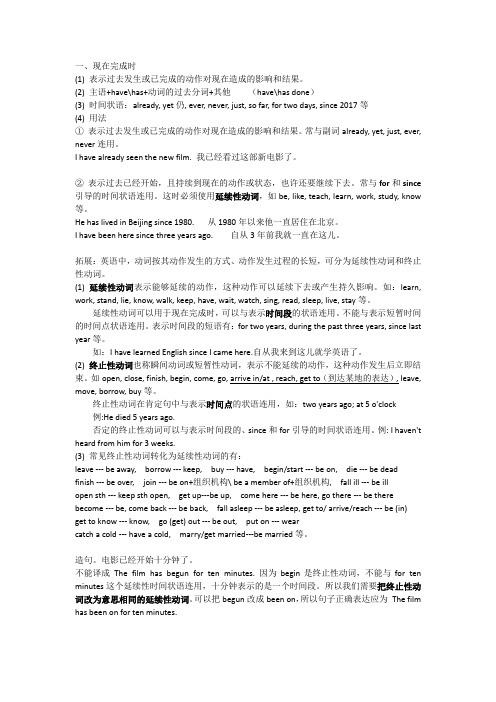
一、现在完成时(1) 表示过去发生或已完成的动作对现在造成的影响和结果。
(2) 主语+have\has+动词的过去分词+其他(have\has done)(3) 时间状语:already, yet仍, ever, never, just, so far, for two days, since 2017等(4) 用法①表示过去发生或已完成的动作对现在造成的影响和结果。
常与副词already, yet, just, ever, never连用。
I have already seen the new film. 我已经看过这部新电影了。
②表示过去已经开始,且持续到现在的动作或状态,也许还要继续下去。
常与for和since 引导的时间状语连用。
这时必须使用延续性动词,如be, like, teach, learn, work, study, know 等。
He has lived in Beijing since 1980. 从1980年以来他一直居住在北京。
I have been here since three years ago. 自从3年前我就一直在这儿。
拓展:英语中,动词按其动作发生的方式、动作发生过程的长短,可分为延续性动词和终止性动词。
(1)延续性动词表示能够延续的动作,这种动作可以延续下去或产生持久影响。
如:learn, work, stand, lie, know, walk, keep, have, wait, watch, sing, read, sleep, live, stay等。
延续性动词可以用于现在完成时,可以与表示时间段的状语连用。
不能与表示短暂时间的时间点状语连用。
表示时间段的短语有:for two years, during the past three years, since last year等。
如:I have learned English since I came here.自从我来到这儿就学英语了。
中考英语八种时态知识点归纳
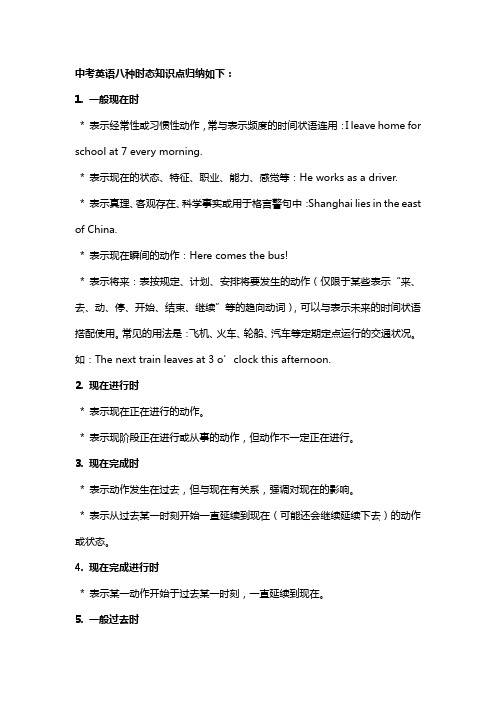
中考英语八种时态知识点归纳如下:1. 一般现在时* 表示经常性或习惯性动作,常与表示频度的时间状语连用:I leave home for school at 7 every morning.* 表示现在的状态、特征、职业、能力、感觉等:He works as a driver.* 表示真理、客观存在、科学事实或用于格言警句中:Shanghai lies in the east of China.* 表示现在瞬间的动作:Here comes the bus!* 表示将来:表按规定、计划、安排将要发生的动作(仅限于某些表示“来、去、动、停、开始、结束、继续”等的趋向动词),可以与表示未来的时间状语搭配使用。
常见的用法是:飞机、火车、轮船、汽车等定期定点运行的交通状况。
如:The next train leaves at 3 o’clock this afternoon.2. 现在进行时* 表示现在正在进行的动作。
* 表示现阶段正在进行或从事的动作,但动作不一定正在进行。
3. 现在完成时* 表示动作发生在过去,但与现在有关系,强调对现在的影响。
* 表示从过去某一时刻开始一直延续到现在(可能还会继续延续下去)的动作或状态。
4. 现在完成进行时* 表示某一动作开始于过去某一时刻,一直延续到现在。
5. 一般过去时* 表示过去某个时间发生的动作或存在的状态。
* 表示过去经常或反复发生的动作。
6. 过去进行时* 表示在过去某一时刻或某一段时间正在进行的动作。
7. 过去完成时* 表示在过去某一时刻之前已经完成或结束的动作或状态。
8. 一般将来时* 表示将来某个时间要发生的动作或存在的状态。
* 表示将来经常或反复发生的动作。
以上就是中考英语中常见的八种时态,希望对你有所帮助。
(完整)初中英语六大时态

六大英语时态一、一般现在时:(1)经常性、习惯性的动作或存在的状态Eg: I go to school on foot.(2) 主语的特征、性格、能力、爱好等Eg: I like watching TV.(3) 客观真理Eg: The moon moves round the earth.其结构按正常语序,即“主语+谓语+其他”。
有时为了起强调作用,时间状语也可提前。
一般现在时的句式变化可分为两种情况:○1一般人称做主语,表示动作变否定句时,须在动词前加助动词don’t;变一般疑问句时,须在句首加助动词do.Eg: 肯定句They have lunch at 12. 否定句:They don’t have lunch at 12. 一般疑问句: Do they have lunch at 12.○2第三人称单数作主语,谓语动词变单三;变否定句时,须在动词前加助动词doesn’t; 变一般疑问句时,须在句首加助动词does Eg: He does morning exercises.→He doesn’t do morning exercises.→Does he often go to school on foot?一般现在时的时间状语有on Saturdays, in the morning(afternoon, evening),every day, at weekend, how often及一些频率副词often, usually, always, sometimes, seldom, never 等。
动词变单三规则1. 一般情况下,在动词后直接加-s Eg: works, gets, says, reads2. 以s, x, sh, ch, o结尾,加-es Eg: goes, teaches, washes, does3. 以“辅音+y” 结尾,变y为i,再加-es Eg: fly-flies, study-studies4. 不规则变化have-has二、一般过去时:表示过去某时发生的动作或情况(1)过去某个时间所发生的动作或存在的状态Eg: He was a worker two years ago.(2) 过去一段时间内,经常性或习惯性的动作Eg: When I was a student, I often played with my classmates.(3)谈到已故人的情况时多用过去时Eg: Lu Xun was a great writer.(4) 有些发生时间不是很清楚(未明确表述)的情况,实际是过去发生的,也应用过去时态Eg: What did you say?一般过去时的结构是“主语+动词的过去式”。
初中英语时态8种基本时态讲解
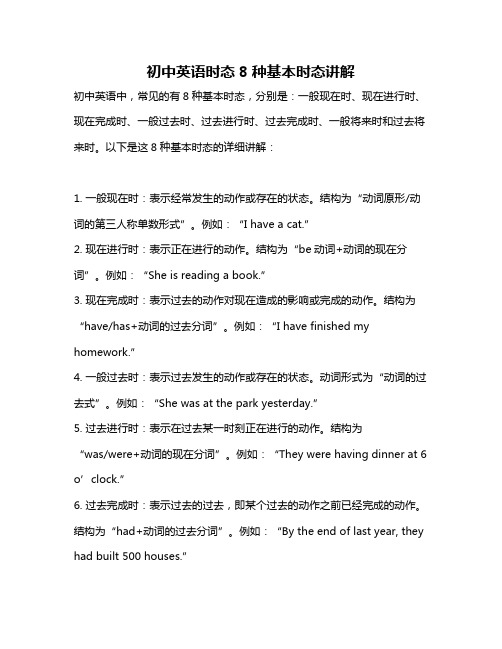
初中英语时态8种基本时态讲解初中英语中,常见的有8种基本时态,分别是:一般现在时、现在进行时、现在完成时、一般过去时、过去进行时、过去完成时、一般将来时和过去将来时。
以下是这8种基本时态的详细讲解:1. 一般现在时:表示经常发生的动作或存在的状态。
结构为“动词原形/动词的第三人称单数形式”。
例如:“I have a cat.”2. 现在进行时:表示正在进行的动作。
结构为“be动词+动词的现在分词”。
例如:“She is reading a book.”3. 现在完成时:表示过去的动作对现在造成的影响或完成的动作。
结构为“have/has+动词的过去分词”。
例如:“I have finished my homework.”4. 一般过去时:表示过去发生的动作或存在的状态。
动词形式为“动词的过去式”。
例如:“She was at the park yesterday.”5. 过去进行时:表示在过去某一时刻正在进行的动作。
结构为“was/were+动词的现在分词”。
例如:“They were having dinner at 6 o’clock.”6. 过去完成时:表示过去的过去,即某个过去的动作之前已经完成的动作。
结构为“had+动词的过去分词”。
例如:“By the end of last year, they had built 500 houses.”7. 一般将来时:表示将来要发生的动作或存在的状态。
结构为“will+动词原形”或“am/is/are going to+动词原形”。
例如:“We will visit the museum next week.”8. 过去将来时:表示从过去的某一时刻看,将来要发生的动作或存在的状态。
结构为“would+动词原形”或“was/were going to+动词原形”。
例如:“He said he would come back soon.”以上就是初中英语8种基本时态的讲解,希望对你有帮助!。
初中英语五种时态讲解
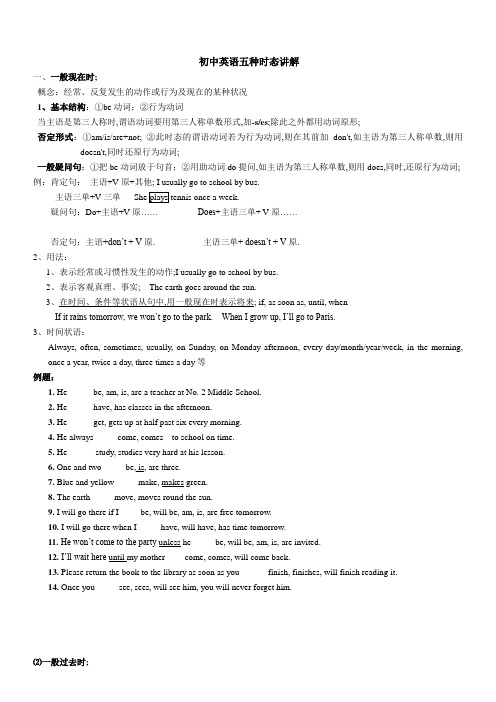
初中英语五种时态讲解一、一般现在时;概念:经常、反复发生的动作或行为及现在的某种状况1、基本结构:①be动词;②行为动词当主语是第三人称时,谓语动词要用第三人称单数形式,加-s/es;除此之外都用动词原形;否定形式:①am/is/are+not; ②此时态的谓语动词若为行为动词,则在其前加don't,如主语为第三人称单数,则用doesn't,同时还原行为动词;一般疑问句:①把be动词放于句首;②用助动词do提问,如主语为第三人称单数,则用does,同时,还原行为动词; 例:肯定句:主语+V原+其他; I usually go to school by bus.主语三单+V三单疑问句:Do+主语+V原…… Does+主语三单+ V原……否定句:主语+don’t + V原. 主语三单+ doesn’t + V原.2、用法:1、表示经常或习惯性发生的动作;I usually go to school by bus.2、表示客观真理、事实; The earth goes around the sun.3、在时间、条件等状语从句中,用一般现在时表示将来; if, as soon as, until, whenIf it rains tomorrow, we won’t go to the park. When I grow up, I’ll go to Paris.3、时间状语:Always, often, sometimes, usually, on Sunday, on Monday afternoon, every day/month/year/week, in the morning, once a year, twice a day, three times a day等例题:1. He______be, am, is, are a teacher at No. 2 Middle School.2. He______have, has classes in the afternoon.3. He______get, gets up at half past six every morning.4. He always _____come, comes to school on time.5. He ______study, studies very hard at his lesson.6. One and two _____be, is, are three.7. Blue and yellow _____make, makes green.8. The earth _____move, moves round the sun.9. I will go there if I ____ be, will be, am, is, are free tomorrow.10. I will go there when I _____have, will have, has time tomorrow.11. He won’t come to the party unless he _____be, will be, am, is, are invited.12. I’ll wait here until my mother ____come, comes, will come back.13. Please return the book to the library as soon as you ______finish, finishes, will finish reading it.14. Once you _____see, sees, will see him, you will never forget him.⑵一般过去时;1、⑴表示过去某个时间发生的动作或存在的状态; I got up late this morning.⑵表示过去的习惯或经常发生的动作;When I was in the countryside. I often swam in the river. I used to go fishing.2、结构:基本结构:①be动词;②行为动词否定形式:①was/were+not; ②在行为动词前加didn't,同时还原行为动词;一般疑问句:①was或were放于句首;②用助动词do的过去式did 提问,同时还原行为动词;例:肯定句:主语+ V过去+其他;疑问句:Did+主语+ V原……否定句:主语+didn’t+ V原3、动词的规则变化;4、时间状语:Yesterday, last night/week/year/month, last Sunday, in 1995, the other day, just now, ago等例题:1. He____be, was, were, been here a moment ago.2. They ____be, was, were, been here just now.3. The scientists _____leave, leaves, leaved, left for America yesterday.4. Last week we ______visit, visited the Science Museum.5. When I was a child, I often ____play, played football.6. The students ran out of the classroom as soon as the bell ____ring, rang, rung.⑶一般将来时;①肯定句:否定句:注:当主语为I 或we时,问句中可用shall where shall we meet tomorrow②be going to+ V原表示计划、打算做某事;用来表示近期或事先考虑过的将要发生的动作以及已有迹象表明必将发生某事,意为“打算;就要”; be going to do 将要干某事---what are you going to do next Sunday ---I am going to listen to music.Look at the clouds, there is going to rain.③现在进行时be +Ving 有时可以表示将来;常用这种结构的动词:go, come, leave, stay, start, arrive We’re leaving for London.例题:1 . _____you ____a doctor when you grow upA .Will; going to be B. Are; going to be C. Are; / D .Will; be2. I don’t know if his uncle _____. I think he _____ if it doesn’t rain.A will come; comesB will come; will comeC comes; comesD comes; will come3 . He will be back _____a few minutes.A withB forC onD in4. What time _____we meet at the gate tomorrowA willB shallC doD are5. He will have a holiday as soon as he _____the work next week.A finishes B. doesn’t finish C will finish D won’t finish6 .There _____some showers this afternoon.A will beB will haveC is going to beD are going to have7. It ____my brother’s birthday tomorrow. She _____a party.A is going to be; will haveB will be; is havingC will be; is going to haveD will have; is going to be8. Li Ming is 10 years old now, next year he _____11.A isB is going to beC will beD will to be与will区别:两者都可表示将要发生的事、将要去做某事,但它们有如下几点区别:1. 表示近期、眼下就要发生的事情,will 表示的将来时间则较远一些,如:He is going to write a letter tonight.He will write a book .2. 表示根据主观判断将来肯定发生的事情,will表示客观上将来势必发生的事情;He is seriously ill. He is going to die.He will be twenty years old.3. be going to 含有“计划,准备”的意思,而will 则没有这个意思,如:She is going to lend us her book.He will be here in half an hour.4.在有的主句中,一般不用be going to, 而多用will, 如:If any beasts comes at you, I'll stay with you and help you4现在进行时1、构成:肯定句:主语+ is / am / are +ving疑问句:Is /Am /Are + 主语+ving否定句:主语+ isn’t / am not / aren’t + ving2、用法:①表示正在进行的动作I’m reading book now.②表示现阶段正在进行的动作或状态; They are studying hard this term.3、时间状语:now , these days, 当句中有look, listen , can’t you see, can you see时Listen He is singing.例题:1. I ____write, am writing, is writing, are writing a letter now.2. Look, it _____begin, is beginning, am beginning, are beginning to rain.3. They ____study, is studying, am studying, are studying medicine at the Medical Institute of Chengde these days.4. He _____teach, am teaching, is teaching, are teaching an English lesson at this time.5 过去进行时1、结构was / were + doing2、用法①表示过去某段时间正在进行的动作---what were you doing at 9:30 last night --- I was watching TV.3、when一般接一般过去时I was doing my homework whenwhile一般接进行时WhileHe was playing basketball while she was reading books.例题:1. I _____cook, cooked, was cooking, were cooking breakfast when you arrived.____you_____ do, did, was...doing, were…doing at this time yesterday eveninghave, are having, had, were having dinner when the doorbell rang.When/ As we____ have, had, are having, were having dinner, the doorbell rang.动词基本变化形式:。
初中英语语法时态总结

初中英语语法时态总结-CAL-FENGHAI.-(YICAI)-Company One1初中英语语法动词时态总结一、一般现在时1)经常性或习惯性的动作,常与表示频度的时间状语连用。
时间状语:every…, sometimes, at…, on Sunday。
例如:I leave home for school at 7 every morning. 每天早上我七点离开家。
2)客观真理,客观存在,科学事实。
例如:The earth moves around the sun. 地球绕太阳转动。
Shanghai lies in the east of China. 上海位于中国东部。
3)表示格言或警句。
例如:Pride goes before a fall. 骄者必败。
注意:此用法如果出现在宾语从句中,即使主句是过去时,从句谓语也要用一般现在时。
例:Columbus proved that the earth is round. 哥伦布证实了地球是圆的。
4)现在时刻的状态、能力、性格、个性。
例如:I don't want so much. 我不要那么多。
Ann writes good English but does not speak well.安英语写得不错,讲的可不行。
比较:Now I put the sugar in the cup. 把糖放入杯子。
I am doing my homework now. 我正在做功课。
第一句用一般现在时,用于操作演示或指导说明的示范性动作,表示言行的瞬间动作。
第二句中的now是进行时的标志,表示正在进行的动作的客观状况,所以后句用一般现在时。
二、一般过去时1)在确定的过去时间里所发生的动作或存在的状态。
例如:时间状语有:yesterday, last week, an hour ago, the other day, in 1982等。
例如:Where did you go just now? 刚才你上哪儿去了?2)表示在过去一段时间内,经常性或习惯性的动作。
初中英语时态8种基本时态归纳

初中8种英语时态归纳初中英语中,时态主要分为以下八种基本时态:1. 现在简单时态(Simple Present Tense):用来表示经常性、习惯性的动作或客观事实。
例如:I go to school every day.(我每天去学校。
)2. 过去简单时态(Simple Past Tense):用来表示过去发生的动作或状态。
例如:She finished her homework yesterday.(她昨天完成了作业。
)3. 将来简单时态(Simple Future Tense):用来表示将来要发生的动作或事件。
例如:We will visit our grandparents next week.(我们下周要去看望我们的祖父母。
)4. 现在进行时态(Present Continuous Tense):用来表示现在正在进行的动作。
例如:They are playing football in the park.(他们正在公园里踢足球。
)5. 过去进行时态(Past Continuous Tense):用来表示过去某一时刻正在进行的动作。
例如:I was studying when he called me.(他给我打电话时,我正在学习。
)6. 将来进行时态(Future Continuous Tense):用来表示将来某一时刻正在进行的动作。
例如:She will be working on her project tomorrow.(明天她会一直在做她的项目。
)7. 现在完成时态(Present Perfect Tense):用来表示过去发生的动作对现在产生的影响或结果。
例如:I have finished my homework.(我已经完成了我的作业。
)8. 过去完成时态(Past Perfect Tense):用来表示过去某个时间点之前已经完成的动作。
例如:They had already left when we arrived.(当我们到达时,他们已经离开了。
初中英语时态6种基本时态归纳
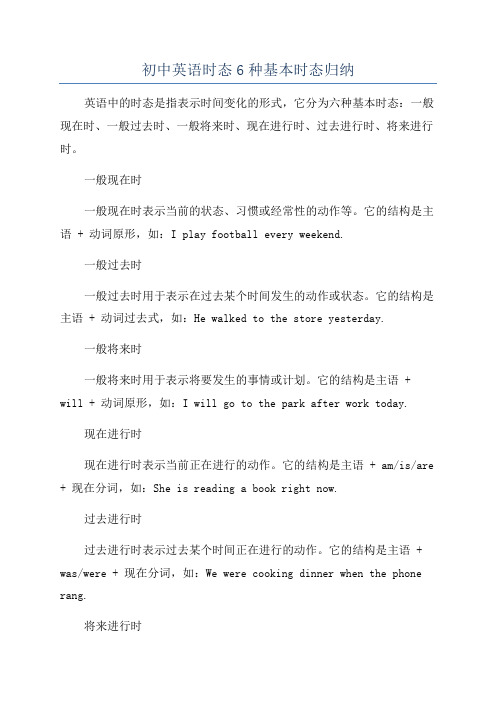
初中英语时态6种基本时态归纳
英语中的时态是指表示时间变化的形式,它分为六种基本时态:一般现在时、一般过去时、一般将来时、现在进行时、过去进行时、将来进行时。
一般现在时
一般现在时表示当前的状态、习惯或经常性的动作等。
它的结构是主语 + 动词原形,如:I play football every weekend.
一般过去时
一般过去时用于表示在过去某个时间发生的动作或状态。
它的结构是主语 + 动词过去式,如:He walked to the store yesterday.
一般将来时
一般将来时用于表示将要发生的事情或计划。
它的结构是主语 +
will + 动词原形,如:I will go to the park after work today.
现在进行时
现在进行时表示当前正在进行的动作。
它的结构是主语 + am/is/are + 现在分词,如:She is reading a book right now.
过去进行时
过去进行时表示过去某个时间正在进行的动作。
它的结构是主语 + was/were + 现在分词,如:We were cooking dinner when the phone rang.
将来进行时
以上六种基本时态是英语语法的基础,掌握好这些时态可以更加流利地表达自己的意思。
同时,还需要注意时态的变化应根据语境和上下文进行判断,确保使用正确的时态,避免造成歧义。
- 1、下载文档前请自行甄别文档内容的完整性,平台不提供额外的编辑、内容补充、找答案等附加服务。
- 2、"仅部分预览"的文档,不可在线预览部分如存在完整性等问题,可反馈申请退款(可完整预览的文档不适用该条件!)。
- 3、如文档侵犯您的权益,请联系客服反馈,我们会尽快为您处理(人工客服工作时间:9:00-18:30)。
初中英语五种时态讲解一、一般现在时。
概念:经常、反复发生的动作或行为及现在的某种状况1、基本结构:①be动词;②行为动词当主语是第三人称时,谓语动词要用第三人称单数形式,加-s/es。
除此之外都用动词原形。
否定形式:①am/is/are+not; ②此时态的谓语动词若为行为动词,则在其前加don't,如主语为第三人称单数,则用doesn't,同时还原行为动词。
一般疑问句:①把be动词放于句首;②用助动词do提问,如主语为第三人称单数,则用does,同时,还原行为动词。
例:肯定句:主语+V原+其他。
I usually go to school by bus.主语(三单)+V三单疑问句:Do+主语+V原…… Does+主语(三单)+ V原……否定句:主语+don’t + V原. 主语(三单)+ doesn’t + V原.2、用法:1、表示经常或习惯性发生的动作。
I usually go to school by bus.2、表示客观真理、事实。
The earth goes around the sun.3、在时间、条件等状语从句中,用一般现在时表示将来。
( if, as soon as, until, when)If it rains tomorrow, we won’t go to the park. When I grow up, I’ll go to Paris.3、时间状语:Always, often, sometimes, usually, on Sunday, on Monday afternoon, every day/month/year/week, in the morning, once a year, twice a day, three times a day等例题:1. He______(be, am, is, are) a teacher at No. 2 Middle School.2. He______(have, has) classes in the afternoon.3. He______(get, gets) up at half past six every morning.4. He always _____(come, comes ) to school on time.5. He ______(study, studies) very hard at his lesson.6. One and two _____(be, is, are) three.7. Blue and yellow _____(make, makes) green.8. The earth _____(move, moves) round the sun.9. I will go there if I ____( be, will be, am, is, are) free tomorrow.10. I will go there when I _____(have, will have, has) time tomorrow.11. He won’t come to the party unless he _____(be, will be, am, is, are) invited.12. I’l l wait here until my mother ____(come, comes, will come) back.13. Please return the book to the library as soon as you ______(finish, finishes, will finish) readingit.14. Once you _____(see, sees, will see) him, you will never forget him.⑵一般过去时。
1、⑴表示过去某个时间发生的动作或存在的状态。
I got up late this morning.⑵表示过去的习惯或经常发生的动作。
When I was in the countryside. I often swam in the river. I used to go fishing.2、结构:基本结构:①be动词;②行为动词否定形式:①was/were+not; ②在行为动词前加didn't,同时还原行为动词。
一般疑问句:①was或were放于句首;②用助动词do的过去式did 提问,同时还原行为动词。
例:肯定句:主语+ V过去+其他。
疑问句:Did+主语+ V否定句:主语+didn’t+ V原……。
3、动词的规则变化。
4、时间状语:Yesterday, last night/week/year/month, last Sunday, in 1995, the other day, just now, ago 等例题:1. He____(be, was, were, been) here a moment ago.2. They ____(be, was, were, been) here just now.3. The scientists _____(leave, leaves, leaved, left) for America yesterday.4. Last week we ______(visit, visited ) the Science Museum.5. When I was a child, I often ____(play, played) football.6. The students ran out of the classroom as soon as the bell ____(ring, rang, rung).⑶一般将来时。
①肯定句:否定句:(注:当主语为I 或 we时,问句中可用 shall) where shall we meet tomorrow②be going to+ V原表示计划、打算做某事。
用来表示近期或事先考虑过的将要发生的动作以及已有迹象表明必将发生某事,意为“打算;就要”。
be going to do 将要干某事---what are you going to do next Sunday ---I am going to listen to music.Look at the clouds, there is going to rain.③现在进行时be +Ving 有时可以表示将来。
常用这种结构的动词:go, come, leave, stay, start, arrive We’re leaving for London.例题:1 . _____you ____a doctor when you grow upA .Will; going to be B. Are; going to be C. Are; / D .Will; be2. I don’t know if his uncle _____. I think he _____ if it doesn’t rain.A will come; comesB will come; will comeC comes; comesD comes; will come3 . He will be back _____a few minutes.A withB forC onD in4. What time _____we meet at the gate tomorrowA willB shallC doD are5. He will have a holiday as soon as he _____the work next week.A finishes B. doesn’t finish C will finish D won’t finish6 .There _____some showers this afternoon.A will beB will haveC is going to beD are going to have7. It ____my brother’s birthday tomorrow. She _____a party.A is going to be; will haveB will be; is havingC will be; is going to haveD will have;is going to be8. Li Ming is 10 years old now, next year he _____11.A isB is going to beC will beD will to bebe going to与will区别:两者都可表示将要发生的事、将要去做某事,但它们有如下几点区别:1. be going to表示近期、眼下就要发生的事情,will 表示的将来时间则较远一些,如:He is going to write a letter tonight.He will write a book one day.2. be going to表示根据主观判断将来肯定发生的事情,will表示客观上将来势必发生的事情。
He is seriously ill. He is going to die.He will be twenty years old.3. be going to 含有“计划,准备”的意思,而 will 则没有这个意思,如:She is going to lend us her book.He will be here in half an hour.4.在有条件从句的主句中,一般不用 be going to, 而多用will, 如:If any beasts comes at you, I'll stay with you and help you(4)现在进行时1、构成:肯定句:主语 + is / am / are +ving疑问句:Is /Am /Are + 主语 +ving否定句:主语+ isn’t / am not / aren’t + ving2、用法:①表示正在进行的动作I’m reading book now.②表示现阶段正在进行的动作或状态。
They are studying hard this term.3、时间状语:now , these days, 当句中有look, listen , can’t you see, can you see时Listen! He is singing.例题:1. I ____(write, am writing, is writing, are writing) a letter now.2. Look, it _____(begin, is beginning, am beginning, are beginning) to rain.3. They ____(study, is studying, am studying, are studying) medicine at the Medical Instituteof Chengde these days.4. He _____(teach, am teaching, is teaching, are teaching) an English lesson at this time.(5) 过去进行时1、结构was / were + doing2、用法① 表示过去某段时间正在进行的动作---what were you doing at 9:30 last night --- I was watching TV.3、when一般接一般过去时 I was doing my homework whenwhile一般接进行时WhileHe was playing basketball while she was reading books.例题:1. I _____(cook, cooked, was cooking, were cooking) breakfast when you arrived.____you_____( do, did, was...doing, were…doing) at this time yesterday evening(have, are having, had, were having) dinner when the doorbell rang.When/ As we____( have, had, are having, were having) dinner, the doorbell rang.动词基本变化形式:。
